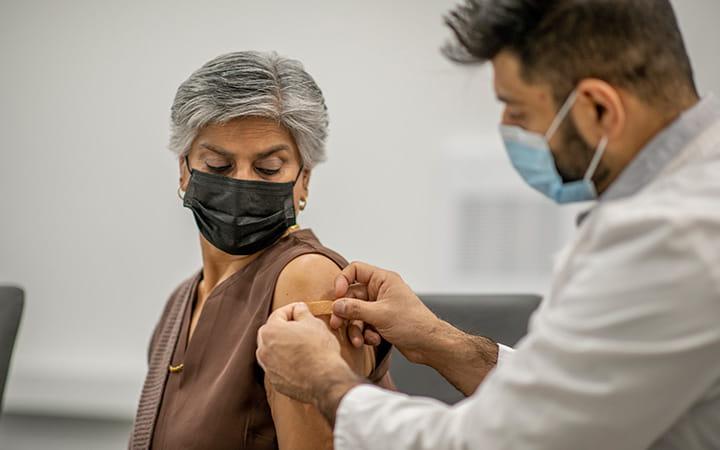What You Can Expect After Getting Vaccinated for COVID-19
March 01, 2021

You or one of your family members might have recently received a COVID-19 vaccination or will get vaccinated in the coming weeks. So what can you expect to happen after you get vaccinated? We talked with UH infectious disease specialist Robert Salata, MD, to learn more about what happens after you receive your first and second inoculation against the coronavirus.
Q. Do I Have to Worry About Getting COVID-19 From the Vaccine?
A. The answer is absolutely not. Of the five that have been studied in the United States, there’s no live virus at all present in these vaccines. It’s only pieces and parts of the virus, if you will. In all of those circumstances, every single vaccine being created, it contains a component of the virus called the spike protein, which is the very component of the virus that allows it to stick to our own human cells, get within it, and it’s also our major point of focus for the protective immune response, when we develop antibodies or t-cell responses against it.
The vaccine cannot give you COVID. The vaccines currently being used -- or any of the vaccines we’re developing -- have no live virus, and therefore you cannot get COVID from the vaccine itself.
Q. What Symptoms Can You Expect After Being Vaccinated?
A. In the large trials that have been published so far, especially the Pfizer vaccine trial -- which we conducted here, one of 120 places around the world -- and Moderna, in about 70 percent of those cases, people had some soreness in their arm after the first dose. Many who have received the shingles vaccine find it to be similar in terms of that side effect.
But beyond that, less than 50 percent of people, especially with the first dose, have other associated side effects, such as flu-like illness that can include fatigue, headache, aching all over, shaking chills, sometimes nausea and vomiting and diarrhea.
But it’s important to emphasize that all of those side effects generally resolve within at most 24 to 36 hours. The second dose, generally, and in the published studies, have had higher rates of those secondary flu-like illnesses that we’ve seen both in our trial and in real life, too.
The other thing to keep in mind is we are encouraging people to receive the vaccine even though they have been previously COVID-infected. It does appear the side effects are more exaggerated in that group of individuals as well.
Q. Why Can the Side Effects Be Worse With the Second Vaccine?
A. I think it’s because you’ve already primed your immune system. The second time through, with exposure to a second dose, your immune system is already revved up to a certain extent and so these symptoms do occur.
Q. Do You Still Need to Wear a Mask After Being Vaccinated for COVID-19?
A. Yes. Right now that is highly recommended.
What we don’t know yet is whether this vaccine will decrease the amount of virus shed by the vaccinated person if they so happen to have asymptomatic COVID infection at the time of getting the first vaccine.
In addition, other people you come in contact with could be shedding the virus. Until we know for sure what the full long-term protective immune response is, we need to still continue with protective measures such as wearing a mask.
There was a recent study with the Astra-Zeneca vaccine that showed in individuals who were infected, but asymptomatic at the time of starting the vaccine, the amount of the virus was diminished in 76 percent of the cases. So it does look like the virus will at least considerably decrease, if not eliminate, viral shedding in that circumstance.
Lastly, until we reach herd immunity, which means being at a level of about 80 percent of the entire population now with these new variants, we need to continue to mask and maintain protective measures. We just don’t want to take chances, especially since there are some cases of re-infection that have been reported around the world, and with these new variants, until we know where that’s going.
Related Links
At University Hospitals, we believe having a primary care physician is essential to your health and well-being. Our primary care providers, or primary care doctors and nurses, provide comprehensive, compassionate and continuous primary care for patients of all ages, from newborns to seniors. Learn more about primary care at University Hospitals or find a primary care physician near you.


